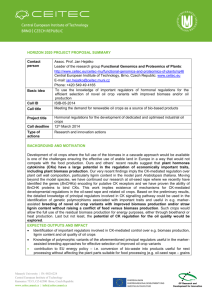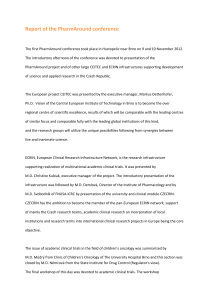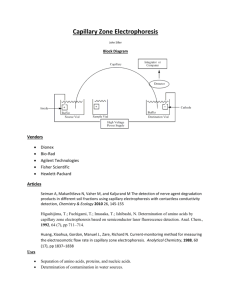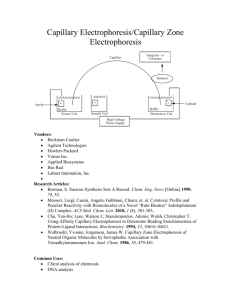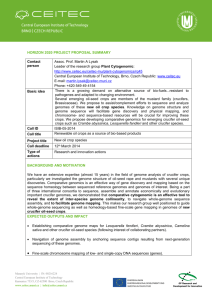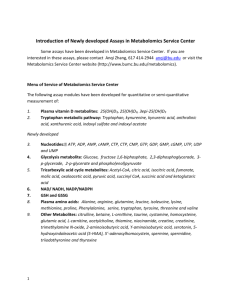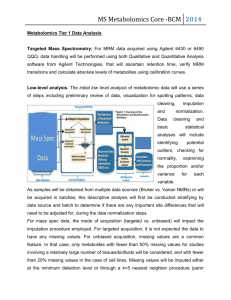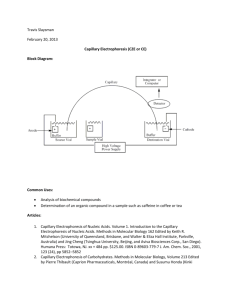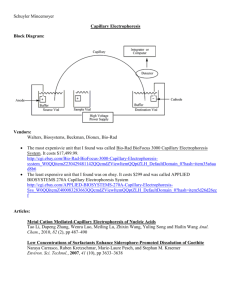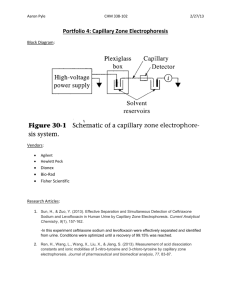Vážený pane, / Vážená paní,
advertisement
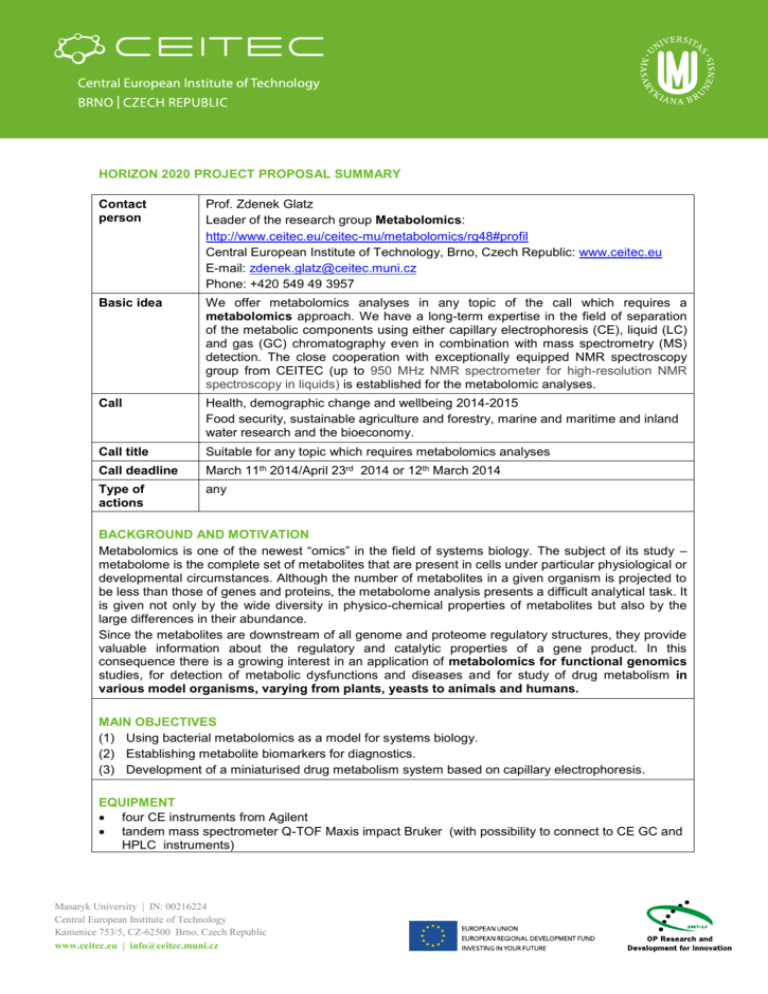
HORIZON 2020 PROJECT PROPOSAL SUMMARY Contact person Prof. Zdenek Glatz Leader of the research group Metabolomics: http://www.ceitec.eu/ceitec-mu/metabolomics/rg48#profil Central European Institute of Technology, Brno, Czech Republic: www.ceitec.eu E-mail: zdenek.glatz@ceitec.muni.cz Phone: +420 549 49 3957 Basic idea We offer metabolomics analyses in any topic of the call which requires a metabolomics approach. We have a long-term expertise in the field of separation of the metabolic components using either capillary electrophoresis (CE), liquid (LC) and gas (GC) chromatography even in combination with mass spectrometry (MS) detection. The close cooperation with exceptionally equipped NMR spectroscopy group from CEITEC (up to 950 MHz NMR spectrometer for high-resolution NMR spectroscopy in liquids) is established for the metabolomic analyses. Call Health, demographic change and wellbeing 2014-2015 Food security, sustainable agriculture and forestry, marine and maritime and inland water research and the bioeconomy. Call title Suitable for any topic which requires metabolomics analyses Call deadline March 11th 2014/April 23rd 2014 or 12th March 2014 Type of actions any BACKGROUND AND MOTIVATION Metabolomics is one of the newest “omics” in the field of systems biology. The subject of its study – metabolome is the complete set of metabolites that are present in cells under particular physiological or developmental circumstances. Although the number of metabolites in a given organism is projected to be less than those of genes and proteins, the metabolome analysis presents a difficult analytical task. It is given not only by the wide diversity in physico-chemical properties of metabolites but also by the large differences in their abundance. Since the metabolites are downstream of all genome and proteome regulatory structures, they provide valuable information about the regulatory and catalytic properties of a gene product. In this consequence there is a growing interest in an application of metabolomics for functional genomics studies, for detection of metabolic dysfunctions and diseases and for study of drug metabolism in various model organisms, varying from plants, yeasts to animals and humans. MAIN OBJECTIVES (1) Using bacterial metabolomics as a model for systems biology. (2) Establishing metabolite biomarkers for diagnostics. (3) Development of a miniaturised drug metabolism system based on capillary electrophoresis. EQUIPMENT four CE instruments from Agilent tandem mass spectrometer Q-TOF Maxis impact Bruker (with possibility to connect to CE GC and HPLC instruments) Masaryk University | IN: 00216224 Central European Institute of Technology Kamenice 753/5, CZ-62500 Brno, Czech Republic www.ceitec.eu | info@ceitec.muni.cz Agilent 6320 Ion Trap for mass spectrometer detection (connected to CE instrument) analytical HPLC system Agilent 1200 connectable to the IT MS system analytical UPLC system Dionex Ultimate 3000 RSLC Thermo 450-GC system Bruker SELECTED PUBLICATIONS Reminek, R., Zeisbergerova, M., Langmajerova, M., Glatz, Z., 2013: A New Capillary Electrophoretic Method for On-line Screenings of Drug Metabolism Mediated by Cytochrome P450 Enzymes. ELECTROPHORESIS 34 (18), p. 2705 - 11. Musilova, J., Glatz, Z., 2011: Metabolomics - Basic Concepts, Strategies and Methodologies. CHEMICKE LISTY 105 (10), p. 745 - 751. Zeisbergerova, M., Reminek, R., Madr, A., Glatz, Z., Hoogmartens, J., Van Schepdael, A., 2010: On-line drug metabolites generation and their subsequent target analysis by capillary zone electrophoresis with UV-absorption detection. ELECTROPHORESIS 31 (19), p. 3256 - 3262. Zeisbergerova, M., Adamkova, A., Glatz, Z., 2009: Integration of on-line protein digestion by trypsin in CZE by means of electrophoretically mediated microanalysis. ELECTROPHORESIS 30 (13), p. 2378 - 2384. Musilova, J., Sedlacek, V., Kucera, I. et al., 2009: Capillary zone electrophoresis with field enhanced sample stacking as a tool for targeted metabolome analysis of adenine nucleotides and coenzymes in Paracoccus denitrificans. JOURNAL OF SEPARATION SCIENCE 32 (14), p. 2416 2420. Konecny, J., Micikova, I., Reminek, R., 2008: Application of micellar electrokinetic capillary chromatography for evaluation of inhibitory effects on cytochrome P450 reaction. JOURNAL OF CHROMATOGRAPHY A 1189 (1-2), p. 274 - 277. CEITEC – A BRIEF INTRODUCTION CEITEC (Central European Institute of Technology) is a joint initiative of si x partners to develop a European centre of excellence. It is being implemented by a consortium of the most prominent Brno universities (Masaryk University, Brno University of Technology) and other four research institutes. The state-of-art instrumentation and technologies will enable interdisciplinary research in the subjects of life and material sciences on all currently available levels of complexity. The major source of funding is the European Regional Development Fund, specifically the Operational Programme Research and Development for Innovations, priority axis 1 – European Centres of Excellence. The overall budget is € 208 mil. CEITEC is based on the synergy of 7 research programmes. One of the scientific programmes is Genomics and Proteomics of Plant Systems comprising eleven research groups. It was established with focus on understanding the evolutionary-based strategies of plant systems to promote their applications in next-generation technologies and medicine. Masaryk University | IN: 00216224 Central European Institute of Technology Kamenice 753/5, CZ-62500 Brno, Czech Republic www.ceitec.eu | info@ceitec.muni.cz
